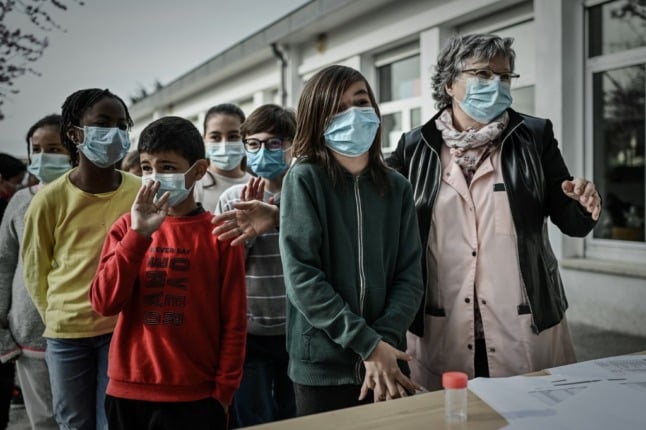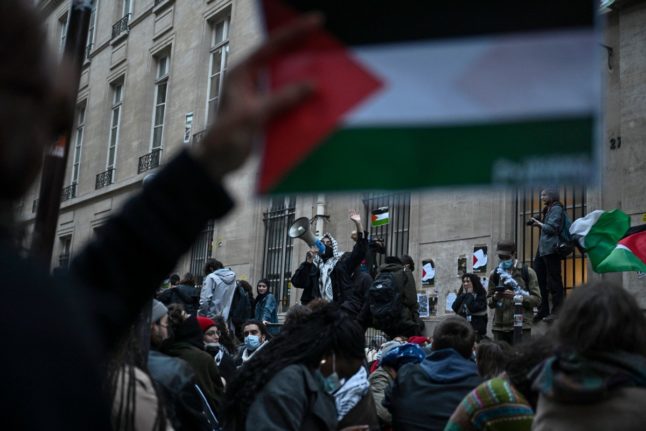Olivier Flipo has been a head teacher for 20 years – and his job has never been harder.
His days are punctuated by a near constant ringing of the phone and the ping of new emails. At the school gates each morning, he checks the attestations of a large portion of the 250 pupils who attend his elementary school in Val-d’Oise. Recently it has been common for more at less than half the pupils to come in.
On top of his normal duties as a headmaster, his work now includes: creating individual health files for pupils; communicating information to the regional health authorities about which students are contact cases, when they may have been infected and who may have infected them; organising extensive cover for infected teachers as the fifth wave rides rampant through France; and staying on top of the constantly changing Covid protocoles issued by the government. He doesn’t have a secretary.
“Since the return to class after the holidays, it has been a horror,” he said. “It is unbearable”
Flipo, who is a delegate for the Val-d’Oise wing of the UNSA teachers’ union, will be joining tens of thousands of school staff going on strike in France on Thursday – to protest the government’s handling of the pandemic.
Primary schools will be most affected, with three quarters of staff going on strike, leading to an estimated half of all primary schools closing for the day.
“It will be a massive movement – the biggest in years,” said Jean-Claude Richoilley, a middle school teacher in the Marne and member of the SNES-FSU teacher’s union.
“The government has managed the Covid policy in schools very badly. The protocol has changed three times in a week,” he said.
Government policy
This constant revision of Covid rules is a key point of contention for teachers.
“The big problem is that when the Education Minister changes the protocol, we are not warned in advance. We learn about it on the TV like everybody else,” said Typhaine Maillard who teaches at a middle school in Solre le Château in the North of France.
“I find that it is a lack of respect. We are forced to improvise at the last minute. We can be warned on Sunday night for new rules coming into place on Monday. It is very stressful.”
The Education Minister, Jean-Michel Blanquer, was criticised for unveiling a new Covid protocol for schools in a Le Parisien article initially available only to paid subscribers, on the day before schools were set to reopen after the Christmas break
The rules changed on December 7th and again on December 10th.
Currently, the rules state that children who are contact cases must take three self-tests, on the day they came into contact with an infected person and again on Day 2 and 4. These tests can be obtained for free at the pharmacy. Before the pupil can return to school, a parent is required to fill out an attestation saying that these tests have been completed.
If another pupil tests positive within a seven days of the previous one, the testing cycle doesn’t need to begin again.
When a pupil tests positive for Covid, their classmates don’t have to be picked up by parents to go for a test straight away but can instead stay at school until the end of the day.
“These incessant changes to the rules are more and more incomprehensible. Parents in front of school say to me that they don’t understand,” said Flipo.
“We have a minister who says he is very proud because we have an education system that is working. But I have had classes where there are just two students. Is that what you call classes working?”
So what do the teachers want?
While teachers unions are united in their support of strike action, their demands vary.
They broadly agree that the government needs to put more resources into things like the high-spec FFP2 masks for teachers and surgical masks for pupils and CO2 captors in classrooms to monitor air purity levels.
Masks have been compulsory for pupils and teachers in French schools since 2020, with a brief pause in some areas with low infection rates in autumn 2021 before they were reinstated.
There is regular testing of pupils in school, using the spit tests for younger pupils.
Vaccination is not compulsory for either pupils or teachers – although more than 90 percent of teachers are vaccinated.
All teachers say that the Education Ministry needs to better communicate further changes.
But not all of the unions are calling for a return of the rule whereby when a pupil tests positive, the class is automatically closed.
“We all have the same objective – that schools don’t close. It creates inequality,” said Flipo, whose union has not called for the return of class closures.
“But a systematic closure of classrooms after one or two infections, with one simple attestation to sign, might be in the interest of families. We need to simplify the system,” he continued.
Maillard’s school will remain open on Thursday – although more than half the teachers, including many who don’t belong to unions, are on strike.
“I have had three pupils test positive in my class, but we carried on. It made me feel worried for my own safety and the safety of the other children. You could tell that they were worried too because they were all talking about it,” she said.
Maillard is not striking as she was ill last week and says she needs to catch her pupils up otherwise they will fall behind. It was a difficult choice.



 Please whitelist us to continue reading.
Please whitelist us to continue reading.
Member comments